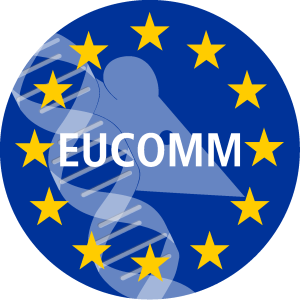Wellcome Trust Sanger Institute has major role in EU initiative to understand the genetic make-up of human diseases
 The sequence of the human and mouse genomes are rich resources for biomedical research. To bring real benefit from genome sequence, scientists must study the ways that the genes identified by DNA sequencing are used in living cells.
The sequence of the human and mouse genomes are rich resources for biomedical research. To bring real benefit from genome sequence, scientists must study the ways that the genes identified by DNA sequencing are used in living cells.
The Wellcome Trust Sanger Institute is a world leader in DNA sequencing and is applying the same determination and skills to gene analysis. That effort is recognized today in the announcement that the Institute is a major partner in a new European Commission consortium – EUCOMM.
This €13M EU Framework Project is designed to help researchers understand the genetic make-up of complex diseases. A repository of mouse stem cells will be generated, each of which contains a mutation in one of the 20,000 or so genes in the mouse genome. The cells will be freely available to the entire scientific community.
“The Sanger Institute is committed to producing biomedical results and resources that are valuable to the wider research community. We are pleased to play a major role in the EUCOMM Programme, which will help researchers to understand the function of any given gene, its role in disease and to move on the road to developing new treatments.”
Professor Allan Bradley Coordinator of the Project and Director of the Wellcome Trust Sanger Institute
With the mouse genome sequence – one fifth of which was produced at the Sanger Institute – it becomes possible to target each gene in turn and inactivate it. The key approach of EUCOMM is to produce ‘conditional’ mutant cells, cells in which the gene can be ‘switched off’ to uncover its biological effects.
Often, a mutation that inactivates a gene can be examined at only one period in the life of an organism – the period at which the gene is first active. However, many genes are used at several different times in life and in several different tissues. These spatially or temporally distinct uses may not be apparent with conventional mutation.
“The Sanger Institute has established cell lines that represent mutations in about 25 per cent of the mouse gene set. Conditional mutations in the cell lines generated by EUCOMM will bring added value since the mutations can be activated at any stage of development.”
“In this new consortium, we will produce a resource in which specific alterations in specific genes can be studied through development and across tissues – a depth of analysis that has not been possible to date. Many of our diseases occur in later age and cell lines produced by the consortium will help researchers to look at diseases that have been difficult or impossible to model.”
Professor Allan Bradley Sanger Institute
The EUCOMM project is the motor of a global research initiative: a new project (NorCOMM), dedicated to set up a complementary mutant repository, is being announced in Canada simultaneously with today’s launch of EUCOMM. NorCOMM is supported by ‘Genome Prairie’ and ‘Genome Canada’, a not-for-profit organization which is leading Canada’s national strategy on genomics with $600 million in funding from the federal government.
Additionally, the US-National Institutes of Health (NIH) has recently launched a call for proposals for a similar research programme to start in July 2006. These world-wide efforts are vital for research into human diseases – scientists and funding agencies are cooperating closely to ensure complementarity and to avoid overlaps between these different efforts. Europe is a world leader in mouse functional genomics and will play a leading role in the global effort to find the relationship between genes and disease.
More information
Selected websites
The Wellcome Trust Sanger Institute
The Wellcome Trust Sanger Institute was founded in 1992 as the focus for the UK sequencing effort of the human and mouse genomes. The Institute is responsible for the completion of the sequence of approximately one-third of the human genome and one-fifth of the mouse, The Institute is also a major contributor to the mapping and sequencing of the zebrafish genome and genomes of more than 90 disease-causing organisms, including TB and malaria. The Wellcome Trust Sanger Institute is based in Hinxton, Cambridge, UK.
The Wellcome Trust and Its Founder
The Wellcome Trust is the most diverse biomedical research charity in the world, spending about £450 million every year both in the UK and internationally to support and promote research that will improve the health of humans and animals. The Trust was established under the will of Sir Henry Wellcome, and is funded from a private endowment, which is managed with long-term stability and growth in mind.


